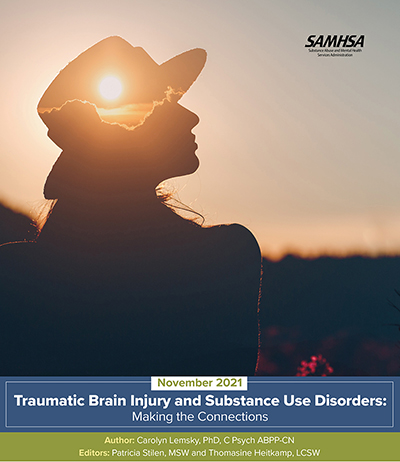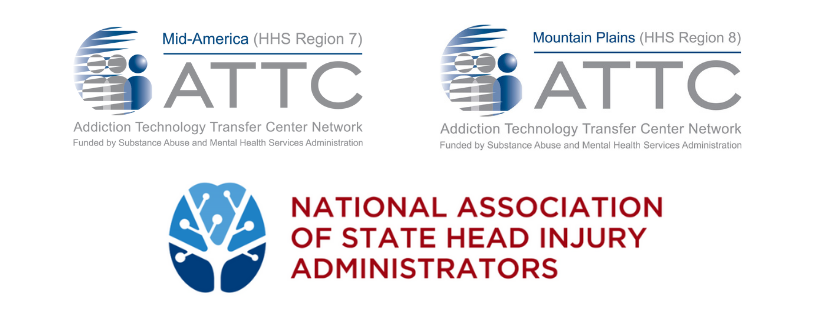![]()
The Mid-America and Mountain Plains Addiction Technology Transfer Centers (ATTCs), in partnership with the National Association of State Head Injury Administrators (NASHIA), offer recorded webinars and a toolkit on the intersection between brain injury and substance use disorders.
Products include:
See below to view and download the toolkit, PowerPoint slides, and other resources!

Traumatic Brain Injury and Substance Use Disorders: Making the Connections
This toolkit merges the content on traumatic brain injury (TBI) and substance use disorders (SUD) to expand capacity to address both issues in treatment. The author, Dr. Carolyn Lemsky, is a board-certified neuropsychologist with over 25 years of experience working in rehabilitation settings in the U.S. and Canada. The toolkit provides valuable and practical information for advancing behavioral health providers’ capacity when serving persons who have brain injuries.
Click here to download the free digital toolkit
Click here to order a hard copy of the toolkit (shipping and handling fees apply)
The toolkit is a collaboration with the Mountain Plains Addiction Technology Transfer Center and the Mid-America Addiction Technology Transfer Center and the National Association of State Head Injury Administrators (NASHIA).
Traumatic Brain Injury and Substance Use Disorders:
Brain Injury 101 TBI & SUD: The Basics
This content provides an overview of brain injury, including information on what brain injury basics and the prevalence within the general population in the context of high-risk populations. It includes content on screening tools and strategies for supporting individuals with brain injury within substance use disorder treatment settings.
Traumatic Brain Injury and Substance Use Disorders:
Intimate Partner Violence (IPV), TBI & SUD
This content introduces the role of intimate partner violence and other abusive tactics—specifically mental health and substance use coercion--as additional drivers of substance misuse and addiction. A critically important consequence of IPV has been hidden in plain sight for decades—brain injury.
Traumatic Brain Injury and Substance Use Disorders:
The Intersection of Brain Injury, Suicide, and Addiction TBI & SUD: Suicide and Addiction
This content explores the relationship between suicide, TBI, and comorbid substance use. Research findings are presented as well as content regarding the brain mechanisms that may mediate this relationship.
Traumatic Brain Injury and Substance Use Disorders:
Part 1: Implications of Traumatic Brain Injury & Addiction
This content introduces the various physical, cognitive, and emotional issues related to this combination of disorders. Content on prevalence and scope of the problem of TBI and SUD is reviewed along with a full description of brain function, cognitive assessment, various modifications to the usual rehabilitation approach, and long-term care.
Traumatic Brain Injury and Substance Use Disorders:
Part 2: Effective Strategies for Group & Individual Therapy
This content examines the executive dysfunction and the process of applying standard SUD treatment to people with executive function difficulty and suggests modifications to the usual rehabilitation approaches.
Traumatic Brain Injury and Substance Use Disorders:
Implications for Justice-Involved: Focus on Justice-Involved Persons with TBI & SUD
This content provides an overview of brain injury and co-occurring mental health and substance use disorders in justice settings. Content on psycho-education approaches in serving this population and accommodations and supports to improve outcomes is provided.
Traumatic Brain Injury and Substance Use Disorders:
Importance of Family Involvement in Treatment
This content describes the complex dilemma families find themselves in when a loved one develops the additional problem of a substance use issue. The impact of SUD on TBI recovery is reviewed, and the impact of SUD on ongoing cognitive and physical rehabilitation.
Traumatic Brain Injury and Substance Use Disorders:
Implications of Use of Stimulants on Traumatic Brain Injury
This content provides a review of the pharmacological characteristics of stimulant medication and medications that provide a stimulant effect and reviews which medications are most effective in enhancing natural recovery and improving fatigue and cognitive functioning when a traumatic brain injury has occurred.
